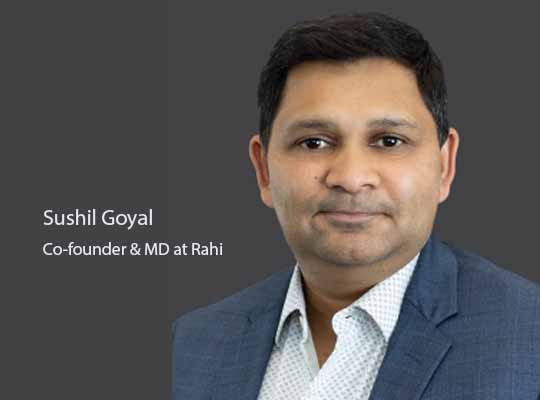TimesTech: What is the breadth of Rahi’s cloud infrastructure offerings across its verticals?
Sushil Goyal: Rahi’s cloud infrastructure services successfully integrate public, private, or hybrid cloud environments into a company’s IT infrastructure. Private clouds allow IT to become a service provider for internal customers, and eliminate many of the objections surrounding security in a public cloud environment. Rahi as a global IT solutions provider offers elevated services for – public, private, hybrid and multi cloud environments. Rahi has expertise in designing and implementing private and hybrid cloud computing environments by offering new solutions or working around existing infrastructure to augment capacity.
Rahi’s hybrid cloud model enables organizations to combine public and private cloud services for optimum efficiency. They are offered through two stages/plans depending upon a company’s budget for cloud service utilization- Basic Cloud Assessment and Premium Cloud Assessment. Through these stages Rahi helps a company select the right cloud operating and platforms, including both open source and proprietary solutions, and deploy a cloud solution that meets the project timeline and budgetary allocations of the potential customer.
TimesTech: What are the financial and technical requirements of businesses that use cloud infrastructure?
Sushil Goyal: A customer looking to move to the cloud has a number of important items to review. First, financially, can that customer shift their spending from a CapEx model to an OpEx model? For large companies used to spending money on assets that depreciate over many years, this can be a big shift. For start-up companies or companies who want to expand as their needs grow, an OpEx model may be more appropriate. It’s an important financial requirement for any business.
On the technical front, there’s an understanding of how cloud assets are managed and how to ensure proper configuration and use. It’s important to have the right technical skills on-staff or to work with a partner like Rahi to bring the right technical skills to any cloud migration or implementation. This includes a review of security and networking best practices, operational behavior for the incident and problem management, and appropriate budgeting and quotas on new services requests. For large companies, this can sometimes require integration with on-premise ticketing, scheduling, and asset services requests. While smaller companies may not have this dilemma, it is important that large organizations consider the ramifications of changing our on-premise systems with cloud systems, and how best to existing ITSM systems of record.
TimesTech: What is the future of data security in India, and what are the risks associated with it?
Sushil Goyal: The state of data security in India is going to improve by a huge factor in the coming years. With the government starting to take conscious and drastic measures to ensure the country’s trajectory towards digitization, has resulted in increased attacks on digital financial infrastructure domain.
The increase in remote working and the shift to cloud based services is making the data more vulnerable every day. The cybersecurity industry as a result is steadily rising to provide the necessary services for securing these platforms. Areas of data security that will continue to be in focus are the privacy and data protection bill, artificial intelligence and machine learning, increase in demand for securing the cloud through adoption of cloud services, IoT security, need for increasing endpoint security. The workforce also poses a major concern until they are trained and upskilled in implementing risk mitigating behaviour. Senior executives, board members need to be aware of robust data security and cyber security solutions that can protect an organization’s information. Inability to do so can adversely impact businesses.
TimesTech: What specifications are customers looking for when planning their cloud infrastructure?
Sushil Goyal: Cloud is an integral part of organizations’ forward-looking strategy. Cloud continues to be the underpinning platform for digital transformation initiatives and has therefore has been witnessing a drastic acceleration in demand. The new normal has witnessed some of the temporary shifts become permanent like hybrid workforce, video calling led customer interactions, remote working among others. As businesses are prioritizing resiliency, agility, and efficiency, they will be adopting cloud-native architectures, allowing them to address customer and end-user demands swiftly.
Things they should keep in mind while planning to shift to cloud based architectures are that clouds need to be well connected, and traditional infrastructure needs to be replaced with cloud based infrastructure which would result in better business outcomes.
TimesTech: What exactly are hyper scale datacenters?
Sushil Goyal: With increased usage and more dependability on IT infrastructure everything is scaling and becoming ‘Hyper’. And, as a result of their massive size, they impose significant environmental costs. Data centers are now attempting to operate on renewable energy to optimize their resource utilization and reduce environmental impacts. The trend will continue, and we will be seeing more and more innovation in sustainable components with improved efficiency. A Hyperscale Data Center is a huge warehouse-like structure with its own servers, routers, storage system, powerhouse, and networks. This is generally used for big data and cloud-based applications. With ever increasing demand for data, hyperscale data centers are expected to grow at an exponential rate in the next decade. Many industries that previously had no or limited access to the IT infrastructure are now moving towards the cloud-based system, primarily triggered by remote working requirements. These Hyperscale Data Centers offer unique ways of energy efficiency and functionality that will make them the preferred choice for most companies.
TimesTech: What are the advantages of having datacenters on cloud rather than on-premise datacenters in this virtual scenario?
Sushil Goyal: The pandemic has changed the global working model. Organisations have adopted hybrid work culture and as a result, companies are shifting to cloud-based data centers. Innovation, efficiency, and sustainability will be the driving force behind any data center technology going forward. Cloud servers, imply that you are using someone else’s resources, whereby the provider ensures quality and maintenance of the system, ensuring better resource optimization. In cloud-based data centers, the data is remotely stored, managed, and backed up on a regular basis. Quality service providers offer the option of securely transmitting data and receiving them via a public network. At any given time, files and documents stored online can be accessed from anywhere. Building a data center from scratch requires a huge Capex investment and time. Cloud-based systems enable seamless customization and scalability. Businesses can buy more storage and even reduce it as per requirements. According to Gartner’s research, user spending on data centre infrastructure will reach $200 billion by the end of 2021, a 6% increase over 2020 levels. You have complete control over your data to ensure that its completely secure from unauthorised access. Common perception is that cloud-based hosts are prone to data leak and hacking, but in reality, they are constantly upgraded with cybersecurity protocols to make sure that all the safety measures are in line and user data is secured.
TimesTech: What are your expansion plans for the next two years?
Sushil Goyal: Rahi believes the cloud market will continue to expand in the coming years, and we will continue to invest in our existing cloud services organization to keep up with the demand for cloud migrations, application modernization, and hybrid cloud deployments. This includes expanding our cloud services teams to keep up with today’s market demands. Rahi believes in building skills through training and certifications, but we will also expand our services team to accommodate a wide range of new cloud use cases, including no-code/low-code deployments, edge caching, and machine learning API use. Cloud is a great option for customers and Rahi is a great services partner to work with for cloud implementations.















